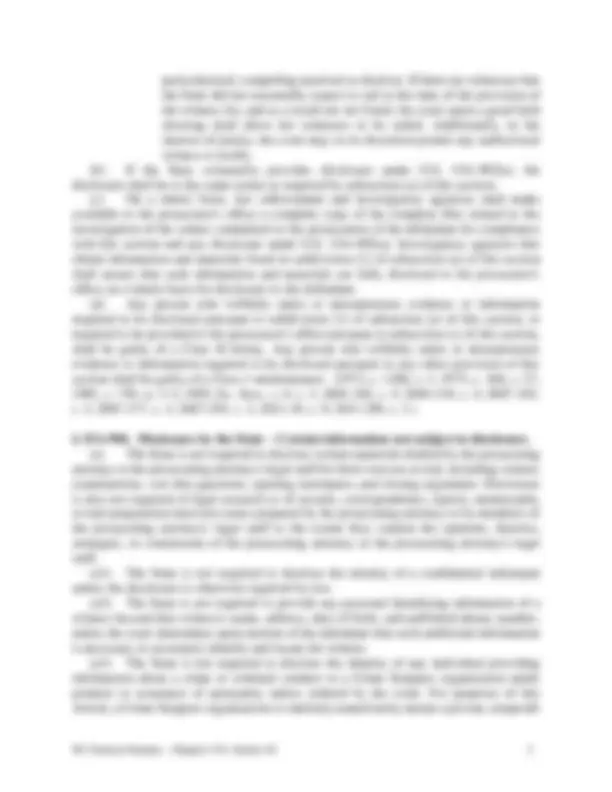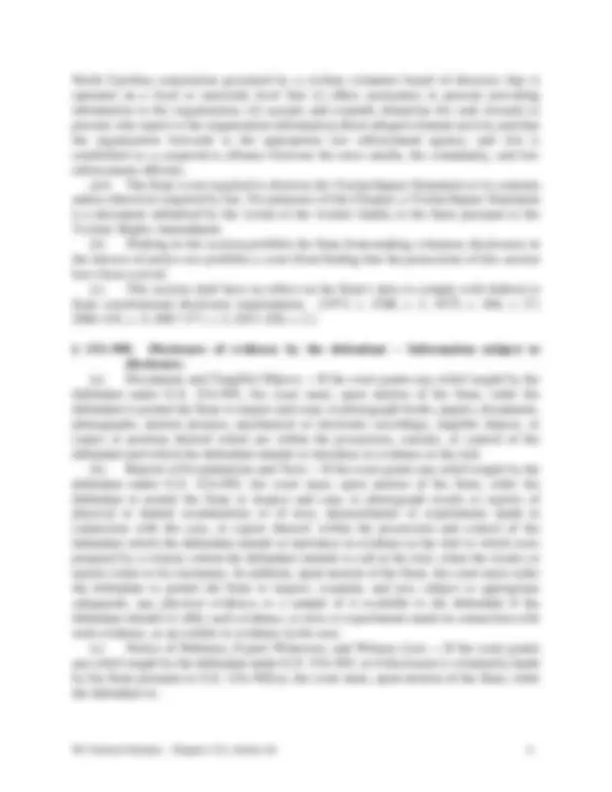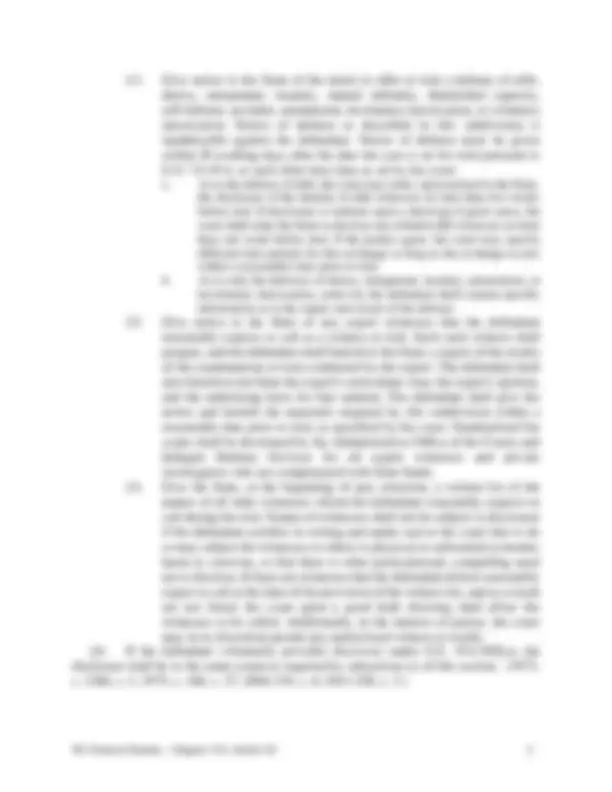





Study with the several resources on Docsity

Earn points by helping other students or get them with a premium plan


Prepare for your exams
Study with the several resources on Docsity

Earn points to download
Earn points by helping other students or get them with a premium plan
Community
Ask the community for help and clear up your study doubts
Discover the best universities in your country according to Docsity users
Free resources
Download our free guides on studying techniques, anxiety management strategies, and thesis advice from Docsity tutors
The voluntary discovery procedures for both the defendant and the State in criminal cases under North Carolina General Statutes Article 48. It covers the timeframe for requests, types of evidence subject to disclosure, and protections for certain information. It also includes provisions for notice of expert witnesses and alibi defense.
What you will learn
Typology: Study notes
1 / 7

This page cannot be seen from the preview
Don't miss anything!




SUBCHAPTER IX. PRETRIAL PROCEDURE. Article 48. Discovery in the Superior Court. § 15A-901. Application of Article. This Article applies to cases within the original jurisdiction of the superior court. (1973, c. 1286, s. 1.) § 15A-902. Discovery procedure. (a) A party seeking discovery under this Article must, before filing any motion before a judge, request in writing that the other party comply voluntarily with the discovery request. A written request is not required if the parties agree in writing to voluntarily comply with the provisions of Article 48 of Chapter 15A of the General Statutes. Upon receiving a negative or unsatisfactory response, or upon the passage of seven days following the receipt of the request without response, the party requesting discovery may file a motion for discovery under the provisions of this Article concerning any matter as to which voluntary discovery was not made pursuant to request. (b) To the extent that discovery authorized in this Article is voluntarily made in response to a request or written agreement, the discovery is deemed to have been made under an order of the court for the purposes of this Article. (c) A motion for discovery under this Article must be heard before a superior court judge. (d) If a defendant is represented by counsel, the defendant may as a matter of right request voluntary discovery from the State under subsection (a) of this section not later than the tenth working day after either the probable-cause hearing or the date the defendant waives the hearing. If a defendant is not represented by counsel, or is indicted or consents to the filing of a bill of information before the defendant has been afforded or waived a probable-cause hearing, the defendant may as a matter of right request voluntary discovery from the State under subsection (a) of this section not later than the tenth working day after the later of: (1) The defendant's consent to be tried upon a bill of information, or the service of notice upon the defendant that a true bill of indictment has been found by the grand jury, or (2) The appointment of counsel. For the purposes of this subsection a defendant is represented by counsel only if counsel was retained by or appointed for the defendant prior to or during a probable-cause hearing or prior to execution by the defendant of a waiver of a probable-cause hearing. (e) The State may as a matter of right request voluntary discovery from the defendant, when authorized under this Article, at any time not later than the tenth working day after disclosure by the State with respect to the category of discovery in question. (f) A motion for discovery made at any time prior to trial may be entertained if the parties so stipulate or if the judge for good cause shown determines that the motion should be allowed in whole or in part. (1973, c. 1286, s. 1; 2004-154, s. 3.) § 15A-903. Disclosure of evidence by the State – Information subject to disclosure. (a) Upon motion of the defendant, the court must order: (1) The State to make available to the defendant the complete files of all law enforcement agencies, investigatory agencies, and prosecutors' offices
involved in the investigation of the crimes committed or the prosecution of the defendant. a. The term "file" includes the defendant's statements, the codefendants' statements, witness statements, investigating officers' notes, results of tests and examinations, or any other matter or evidence obtained during the investigation of the offenses alleged to have been committed by the defendant. When any matter or evidence is submitted for testing or examination, in addition to any test or examination results, all other data, calculations, or writings of any kind shall be made available to the defendant, including, but not limited to, preliminary test or screening results and bench notes. b. The term "prosecutor's office" refers to the office of the prosecuting attorney. b1. The term "investigatory agency" includes any public or private entity that obtains information on behalf of a law enforcement agency or prosecutor's office in connection with the investigation of the crimes committed or the prosecution of the defendant. c. Oral statements shall be in written or recorded form, except that oral statements made by a witness to a prosecuting attorney outside the presence of a law enforcement officer or investigatorial assistant shall not be required to be in written or recorded form unless there is significantly new or different information in the oral statement from a prior statement made by the witness. d. The defendant shall have the right to inspect and copy or photograph any materials contained therein and, under appropriate safeguards, to inspect, examine, and test any physical evidence or sample contained therein. (2) The prosecuting attorney to give notice to the defendant of any expert witnesses that the State reasonably expects to call as a witness at trial. Each such witness shall prepare, and the State shall furnish to the defendant, a report of the results of any examinations or tests conducted by the expert. The State shall also furnish to the defendant the expert's curriculum vitae, the expert's opinion, and the underlying basis for that opinion. The State shall give the notice and furnish the materials required by this subsection within a reasonable time prior to trial, as specified by the court. Standardized fee scales shall be developed by the Administrative Office of the Courts and Indigent Defense Services for all expert witnesses and private investigators who are compensated with State funds. (3) The prosecuting attorney to give the defendant, at the beginning of jury selection, a written list of the names of all other witnesses whom the State reasonably expects to call during the trial. Names of witnesses shall not be subject to disclosure if the prosecuting attorney certifies in writing and under seal to the court that to do so may subject the witnesses or others to physical or substantial economic harm or coercion, or that there is other
North Carolina corporation governed by a civilian volunteer board of directors that is operated on a local or statewide level that (i) offers anonymity to persons providing information to the organization, (ii) accepts and expends donations for cash rewards to persons who report to the organization information about alleged criminal activity and that the organization forwards to the appropriate law enforcement agency, and (iii) is established as a cooperative alliance between the news media, the community, and law enforcement officials. (a4) The State is not required to disclose the Victim Impact Statement or its contents unless otherwise required by law. For purposes of this Chapter, a Victim Impact Statement is a document submitted by the victim or the victim's family to the State pursuant to the Victims' Rights Amendment. (b) Nothing in this section prohibits the State from making voluntary disclosures in the interest of justice nor prohibits a court from finding that the protections of this section have been waived. (c) This section shall have no effect on the State's duty to comply with federal or State constitutional disclosure requirements. (1973, c. 1286, s. 1; 1975, c. 166, s. 27; 2004 - 154, s. 5; 2007-377, s. 2; 2011-250, s. 2.) § 15A-905. Disclosure of evidence by the defendant – Information subject to disclosure. (a) Documents and Tangible Objects. – If the court grants any relief sought by the defendant under G.S. 15A-903, the court must, upon motion of the State, order the defendant to permit the State to inspect and copy or photograph books, papers, documents, photographs, motion pictures, mechanical or electronic recordings, tangible objects, or copies or portions thereof which are within the possession, custody, or control of the defendant and which the defendant intends to introduce in evidence at the trial. (b) Reports of Examinations and Tests. – If the court grants any relief sought by the defendant under G.S. 15A-903, the court must, upon motion of the State, order the defendant to permit the State to inspect and copy or photograph results or reports of physical or mental examinations or of tests, measurements or experiments made in connection with the case, or copies thereof, within the possession and control of the defendant which the defendant intends to introduce in evidence at the trial or which were prepared by a witness whom the defendant intends to call at the trial, when the results or reports relate to his testimony. In addition, upon motion of the State, the court must order the defendant to permit the State to inspect, examine, and test, subject to appropriate safeguards, any physical evidence or a sample of it available to the defendant if the defendant intends to offer such evidence, or tests or experiments made in connection with such evidence, as an exhibit or evidence in the case. (c) Notice of Defenses, Expert Witnesses, and Witness Lists. – If the court grants any relief sought by the defendant under G.S. 15A-903, or if disclosure is voluntarily made by the State pursuant to G.S. 15A-902(a), the court must, upon motion of the State, order the defendant to:
(1) Give notice to the State of the intent to offer at trial a defense of alibi, duress, entrapment, insanity, mental infirmity, diminished capacity, self-defense, accident, automatism, involuntary intoxication, or voluntary intoxication. Notice of defense as described in this subdivision is inadmissible against the defendant. Notice of defense must be given within 20 working days after the date the case is set for trial pursuant to G.S. 7A-49.4, or such other later time as set by the court. a. As to the defense of alibi, the court may order, upon motion by the State, the disclosure of the identity of alibi witnesses no later than two weeks before trial. If disclosure is ordered, upon a showing of good cause, the court shall order the State to disclose any rebuttal alibi witnesses no later than one week before trial. If the parties agree, the court may specify different time periods for this exchange so long as the exchange occurs within a reasonable time prior to trial. b. As to only the defenses of duress, entrapment, insanity, automatism, or involuntary intoxication, notice by the defendant shall contain specific information as to the nature and extent of the defense. (2) Give notice to the State of any expert witnesses that the defendant reasonably expects to call as a witness at trial. Each such witness shall prepare, and the defendant shall furnish to the State, a report of the results of the examinations or tests conducted by the expert. The defendant shall also furnish to the State the expert's curriculum vitae, the expert's opinion, and the underlying basis for that opinion. The defendant shall give the notice and furnish the materials required by this subdivision within a reasonable time prior to trial, as specified by the court. Standardized fee scales shall be developed by the Administrative Office of the Courts and Indigent Defense Services for all expert witnesses and private investigators who are compensated with State funds. (3) Give the State, at the beginning of jury selection, a written list of the names of all other witnesses whom the defendant reasonably expects to call during the trial. Names of witnesses shall not be subject to disclosure if the defendant certifies in writing and under seal to the court that to do so may subject the witnesses or others to physical or substantial economic harm or coercion, or that there is other particularized, compelling need not to disclose. If there are witnesses that the defendant did not reasonably expect to call at the time of the provision of the witness list, and as a result are not listed, the court upon a good faith showing shall allow the witnesses to be called. Additionally, in the interest of justice, the court may in its discretion permit any undisclosed witness to testify. (d) If the defendant voluntarily provides discovery under G.S. 15A-902(a), the disclosure shall be to the same extent as required by subsection (c) of this section. (1973, c. 1286, s. 1; 1975, c. 166, s. 27; 2004-154, s. 6; 2011-250, s. 3.)
(b) Prior to finding any sanctions appropriate, the court shall consider both the materiality of the subject matter and the totality of the circumstances surrounding an alleged failure to comply with this Article or an order issued pursuant to this Article. (c) For purposes of determining whether to impose personal sanctions for untimely disclosure of law enforcement and investigatory agencies' files, courts and State agencies shall presume that prosecuting attorneys and their staffs have acted in good faith if they have made a reasonably diligent inquiry of those agencies under G.S. 15A-903(c) and disclosed the responsive materials. (d) If the court imposes any sanction, it must make specific findings justifying the imposed sanction. (1973, c. 1286, s. 1; 1975, c. 166, s. 17; 1983, Ex. Sess., c. 6, s. 3; 2004 - 154, s. 9; 2011-250, s. 4.) §§ 15A-911 through 15A-920. Reserved for future codification purposes.